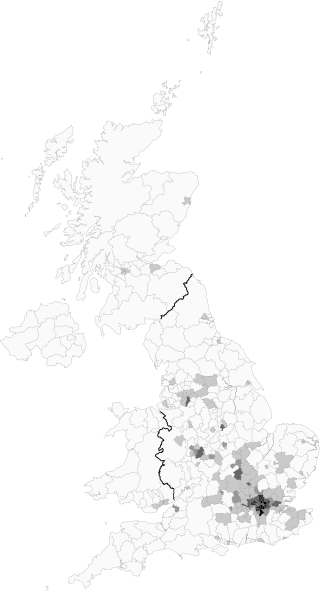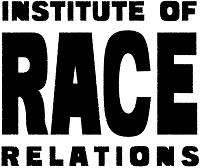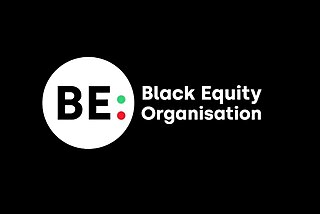Racial profiling or ethnic profiling is the act of suspecting, targeting or discriminating against a person on the basis of their ethnicity, religion, or nationality, rather than on individual suspicion or available evidence. Racial profiling involves discrimination against minority populations and often builds on negative stereotypes of the targeted demographic. Racial profiling can involve disproportionate stop searches, traffic stops, and the use of surveillance technology for facial identification.

David Lammy is an English politician and lawyer serving as Shadow Secretary of State for Foreign, Commonwealth and Development Affairs since 2021. A member of the Labour Party, he has been Member of Parliament (MP) for Tottenham since the 2000 Tottenham by-election.

Sir Mark Trevor Phillips is a British writer, broadcaster and former politician who served as Chair of the London Assembly from 2000 to 2001 and from 2002 to 2003. He presented Trevor Phillips on Sunday, a Sunday morning talk show on Sky News, from 2021 to 2022, and Sunday Morning on Sky News from 2023
The Runnymede Trust is a British race equality and civil rights think tank. It was founded by Jim Rose and Anthony Lester as an independent source for generating intelligence for a multi-ethnic Britain through research, network building, leading debate and policy engagement. The Trust began operations in 1968, the year of two major events in global and British race relations: the assassination of Martin Luther King Jr and Enoch Powell's "Rivers of Blood" speech. Runnymede Trust has played a leading role in the UK's national debate around race, helping shape legislation including the 1971 and 19756 Race Relations Acts, introducing popular usage of the term "Islamophobia" with its 1996 Commission on British Muslims, and more recently its work informing civil society's debate of issues including the 2021 Sewell Report and the Nationality and Borders Act 2022. The Trust is led by its director and chief executive, Halima Begum, appointed in 2020. Its chairman is Sir Clive Jones.

Black British people are a multi-ethnic group of British citizens of either African or Afro-Caribbean descent. The term Black British developed in the 1950s, referring to the Black British West Indian people from the former Caribbean British colonies in the West Indies now referred to as the Windrush Generation and people from Africa, who are residents of the United Kingdom and are British citizens.

The Institute of Race Relations (IRR) is a think tank based in the United Kingdom. It was formed in 1958 in order to publish research on race relations worldwide, and in 1972 was transformed into an "anti-racist think tank".
Race relations is a sociological concept that emerged in Chicago in connection with the work of sociologist Robert E. Park and the Chicago race riot of 1919. Race relations designates a paradigm or field in sociology and a legal concept in the United Kingdom. As a sociological field, race relations attempts to explain how racial groups relate to each other. These relations vary depending on historical, social, and cultural context. The term is used in a generic way to designate race related interactions, dynamics, and issues.
Munira Mirza is a British political advisor who served as Director of the Number 10 Policy Unit under Prime Minister Boris Johnson from 2019 until she resigned in February 2022. She previously worked under Johnson as Deputy Mayor for Education and Culture when he was Mayor of London.
Societal racism is a type of racism based on a set of institutional, historical, cultural and interpersonal practices within a society that places one or more social or ethnic groups in a better position to succeed and disadvantages other groups so that disparities develop between the groups. Societal racism has also been called structural racism, because, according to Carl E. James, society is structured in a way that excludes substantial numbers of people from minority backgrounds from taking part in social institutions. Societal racism is sometimes referred to as systemic racism as well.

Racism in the United Kingdom refers to negative attitudes and views on race or ethnicity within the viewpoints of groups or individuals or existing systemically in the United Kingdom. The extent and the targets of racist attitudes in the United Kingdom have varied over time. It has resulted in cases of discrimination, riots and racially motivated murders. Racism was uncommon in the attitudes and norms of the British class system during the 19th century, in which race mattered less than social distinction: an African tribal chief was unquestionably superior to an English costermonger. Use of the word "racism" became more widespread after 1936, although the term "race hatred" was used in the late 1920s by sociologist Frederick Hertz. Laws were passed in the 1960s that specifically prohibited racial segregation.

Stephen Bourne is a British writer, film and social historian specialising in Black heritage and gay culture.
Patrick Philip Vernon is a British social commentator and political activist of Jamaican heritage, who works in the voluntary and public sector. He is a former Labour councillor in the London Borough of Hackney. His career has been involved with developing and managing health and social care services, including mental health, public health, regeneration and employment projects. Also a film maker and amateur cultural historian, he runs his own social enterprise promoting the history of diverse communities, as founder of Every Generation and the "100 Great Black Britons" campaign. He is also an expert on African and Caribbean genealogy in the UK. He was appointed a Clore Fellow in 2007, an Officer of the Order of the British Empire (OBE) in the 2012 Birthday Honours for "services to the Reduction of Health Inequalities for Ethnic Minorities", and in 2018 was awarded an honorary doctorate from the University of Wolverhampton.
There have been incidents of racism in the Conservative Party since at least 1964. Conservative shadow defence minister Enoch Powell's "Rivers of Blood" speech in 1968 was both influential and widely regarded as anti-immigrant with racist overtones; the party's leader at the time, Edward Heath, condemned it, although some Conservative MPs defended Powell's speech. Since then, accusations have been made about several leading members of the party and its policies; these have related to prejudice against non-white people.
The Lammy Review is a 2017 review on discrimination within the policing and criminal justice systems in the UK, led by David Lammy and commissioned by David Cameron and Theresa May. The Lammy Review found significant racial bias in the UK justice system.

Cleveland Anthony Sewell, Baron Sewell of Sanderstead,, is a British educational consultant and founder and chair of the educational charity Generating Genius. In July 2020, Sewell was appointed chair of the Commission on Race and Ethnic Disparities tasked with looking into race disparity in the UK. Sewell sits as a life peer in the House of Lords. He has been described as an admirer of the Black conservative scholar Thomas Sowell.

The COVID-19 pandemic has revealed race-based health care disparities in many countries, including the United States, United Kingdom, Norway, Sweden, Canada, and Singapore. These disparities are believed to originate from structural racism in these countries which pre-dates the pandemic; a commentary in The BMJ noted that "ethnoracialised differences in health outcomes have become the new normal across the world" as a result of ethnic and racial disparities in COVID-19 healthcare, determined by social factors. Data from the United States and elsewhere shows that minorities, especially black people, have been infected and killed at a disproportionate rate to white people.
Jacqueline "Jacqui" McKenzie is a British human rights lawyer specialising in migration, asylum and refugee law. Her legal career encompasses practice in the areas of civil liberties, crime and immigration with solicitors Birnberg Peirce and Partners, and since 2010 running her own immigration consultancy, McKenzie Beute and Pope (MBP), having previously spent more than a decade in senior local government roles with responsibility for equalities, community development, communications and urban development. She joined human rights law firm Leigh Day as a partner in 2021. She is the founder of the Organisation of Migration Advice and Research, which works pro bono with refugees and women who have been trafficked to the UK. McKenzie has won recognition for her work seeking justice for victims of the Windrush scandal that initially gained notoriety in 2018. She was named one of the top 10 most influential black Britons in the Powerlist 2022.

Mercy Muroki is a Kenyan-British researcher, journalist, and television presenter. She was a member of the UK government's Commission on Race and Ethnic Disparities in 2021. In the same year, she began presenting on GB News, as well as writing columns for tabloid newspaper The Sun.

Mohammad Sharif Razai is a physician, poet, author and researcher. He was awarded the 2021 John Maddox Prize as an early career researcher, by Sense about Science and Nature for his work on racial health inequalities.

The Black Equity Organisation (BEO) is a civil rights organisation and anti-racism charity in the United Kingdom, launched in 2022 with the aim of dismantling systemic racism.











